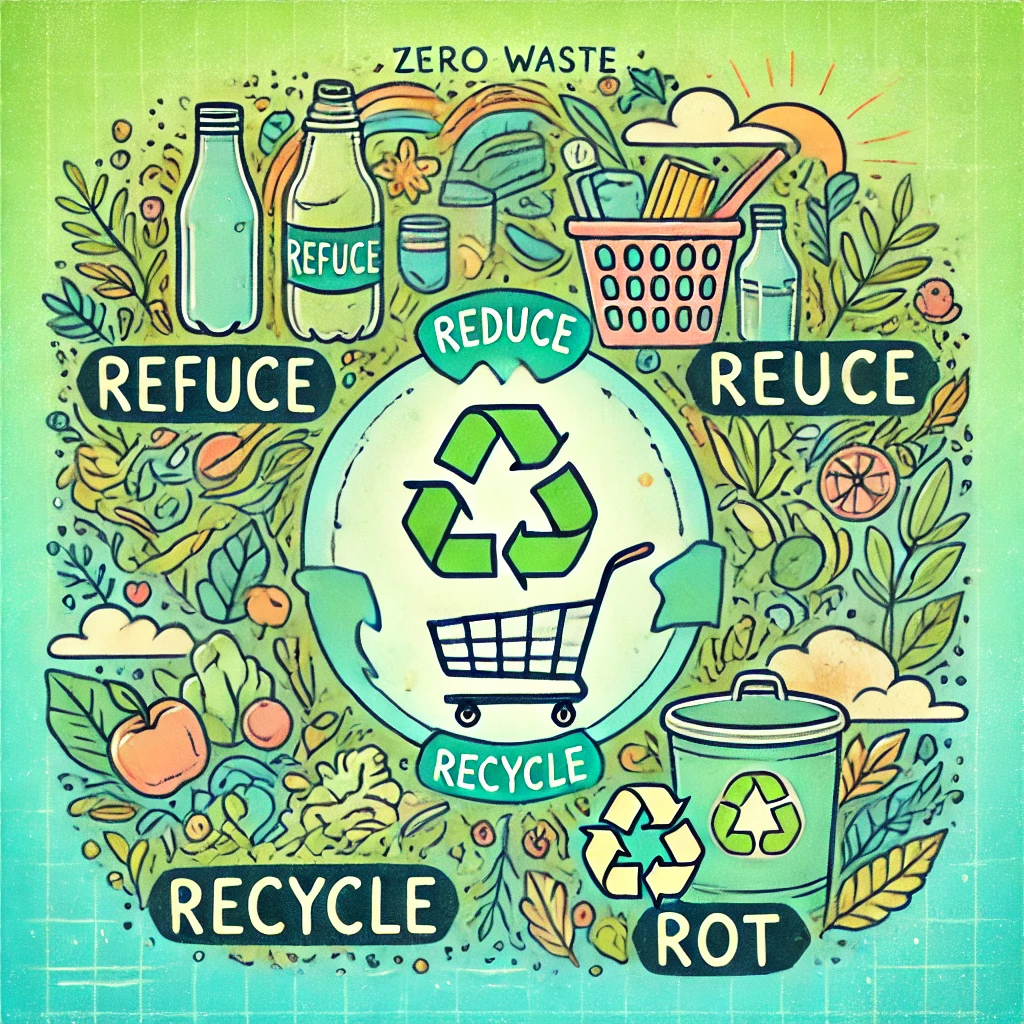
Sustainable Living and Eco-Friendly
10 Ways to Adopt a Zero Waste Lifestyle


DINKAR
11/8/2024
Introduction:
In a world where waste is becoming increasingly difficult to manage, adopting a zero-waste lifestyle can make a significant impact. This approach encourages you to minimize waste, reuse materials, and recycle what you can to prevent items from ending up in landfills. Whether you’re looking to reduce your environmental footprint, save money, or live a simpler, more mindful life, zero-waste living is a rewarding choice. Here are ten practical ways to help you get started on your journey to a more sustainable, zero-waste lifestyle.
1. Say No to Single-Use Plastics
Single-use plastics are one of the biggest contributors to waste. Items like plastic bags, straws, and water bottles can take hundreds of years to break down, causing harm to wildlife and polluting ecosystems. To start, carry a reusable bag, water bottle, and metal or silicone straw with you at all times. Many stores now offer paper or compostable bags, but bringing your own reusable items will cut down on waste even more.
Tip: Invest in a sturdy reusable bag and bottle that you’ll enjoy using every day.
2. Buy in Bulk
Buying in bulk reduces packaging waste and often saves money. Many bulk stores and supermarkets now let you bring your own containers, making it easy to purchase items like grains, nuts, spices, and even cleaning supplies. Check with local stores on their bulk buying policies, and consider purchasing from zero-waste shops that focus on sustainable packaging options.
Tip: Bring glass jars or cloth bags to carry your bulk goods.
3. Compost Food Scraps
Organic waste, like fruit and vegetable scraps, can be composted instead of thrown away. Composting turns this waste into nutrient-rich soil that can be used for gardening. If you live in an apartment, there are indoor composting options, such as vermiculture (worm composting) or small countertop compost bins.
Tip: Start small by composting coffee grounds, eggshells, and fruit peels, and gradually work up to more organic waste.
4. Switch to Reusable Household Items
In many households, paper towels, napkins, and disposable cleaning products are often used once and then thrown away. Replace these items with reusable alternatives, like cloth napkins, washable dishcloths, and microfiber cleaning cloths. These swaps reduce waste and often save money over time.
Tip: Keep a stash of cloth napkins or rags in the kitchen so they’re easy to grab.
5. Make Eco-Friendly Personal Care Choices
Personal care products, like shampoo, conditioner, and toothpaste, often come in plastic packaging. Fortunately, zero-waste stores and online shops offer solid shampoo bars, toothpaste tablets, and other plastic-free alternatives. Making these small changes can drastically reduce your bathroom waste.
Tip: Look for brands that use biodegradable or compostable packaging and ingredients that are safe for the environment.
6. Repurpose Glass Jars and Containers
Glass jars are one of the most versatile items you can reuse at home. From storing food and pantry staples to organizing office supplies, glass jars can serve many purposes. Instead of recycling, try to find ways to reuse them around the house.
Tip: Label your jars with the contents inside to make them more functional for storage.
7. Plan Meals and Avoid Food Waste
Food waste is a common problem, especially when we buy more than we need. Planning meals helps you avoid over-purchasing and reduces the likelihood of spoiled food. Make a list of what you already have in your fridge or pantry before shopping, and plan your meals around those items.
Tip: Use apps or simple lists to keep track of food items at home, and create meal plans that incorporate leftovers.
8. Repair Before Replacing
In a consumer-driven world, it’s easy to replace broken items instead of repairing them. Take a zero-waste approach by trying to repair or repurpose items first. From mending clothes to fixing small appliances, there are countless tutorials and resources to help you extend the life of your belongings.
Tip: Check local repair shops or look for community events like “repair cafes” that offer assistance with fixing various items.
9. Reduce Paper Waste
Paper waste includes junk mail, receipts, and single-use paper products. You can reduce this by unsubscribing from mailing lists, opting for digital bills and receipts, and only printing when necessary. You can also reuse paper for notes or scrap paper before recycling it.
Tip: For unavoidable paper waste, set up a dedicated recycling bin for easier sorting and disposal.
10. Educate and Encourage Others
Living a zero-waste lifestyle can inspire those around you. Share your knowledge and experience with family, friends, and coworkers. Whether you talk about the benefits of composting or show how you shop in bulk, raising awareness can encourage others to take steps toward reducing their own waste.
Tip: Join zero-waste communities online or in person to gain support and share tips with like-minded individuals.
Conclusion:
Adopting a zero-waste lifestyle doesn’t have to be difficult or overwhelming. By making small, sustainable changes to your daily habits, you can reduce waste and live a more mindful, eco-friendly life. These ten tips are just the beginning; as you grow more comfortable, you’ll find even more ways to reduce your environmental footprint and inspire those around you to do the same. Embracing zero-waste practices helps you live with purpose, reduce waste, and contribute to a healthier planet.